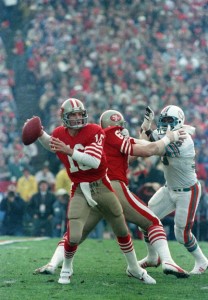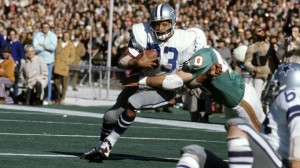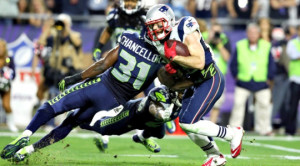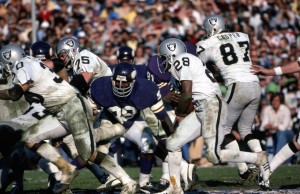Counting Down the Greatest Offensive Performances in Super Bowl History: 50-26

Joe Montana was supposed to be the “other quarterback” in Super Bowl XIX, but instead led the 49ers to a dominant victory over the Miami Dolphins.
Since Super Bowl I in 1967, the “big game” has become the premier stage for NFL players to either create or cement their legacy. The first 47 Super Bowls are full of special Super Bowl performances. Some were by familiar names that used the Super Bowl to either put a stamp on a Hall of Fame career or propel them into a spot in Canton. But not every Super Bowl hero was a household name before their performance on the big stage. There have been several players whose otherwise unspectacular career includes one shining performance in front of one of the largest television crowds of all-time.
In this article and the second part (which will be posted later this week), we are looking specifically at the 50 best individual performances on offense in a Super Bowl.
To develop the list we did take into account game statistics, but also looked at game situations when analyzing which players and moments were worthy of inclusion. For example, though Joe Montana tossed five touchdowns as the 49ers routed Denver in Super Bowl XXIV, he actually was ranked higher in other Super Bowls because his performance in critical moments was instrumental to their victory.
In ranking performances whether the team won the game was considered, but there have been some Super Bowl performances by players on losing teams that were clearly among the most important. One thing that received little consideration was who was awarded the Super Bowl MVP as there have been numerous occasions when the MVP award has gone to someone other than the player who seemingly provided the best performance.
So below is a countdown of performances 50-26.
50. Kurt Warner – Arizona Cardinals – Super Bowl XLIII – 31-43, 377 yards, 3 TD, 1 INT
For a fleeting moment, it appeared that Kurt Warner was going to be the first quarterback to lead two different franchises to Super Bowl victory. He and the Cardinals played well enough to win, but a late Pittsburgh drive denied them of victory. Interestingly enough, Warner holds the record for the top three passing yardage totals in Super Bowl history with his 377 yards in Super Bowl XLIII ranking second.
49. Rod Smith – Denver Broncos – Super Bowl XXXIII – 5 rec., 152 yards, 1 TD
While Terrell Davis and John Elway are the best remembered offensive players from their back-to-back Super Bowl wins, receiver Rod Smith also played an important role in their win over the Falcons. His 80-yard reception in the second quarter helped break the game open and he finished with 152 receiving yards.
48. Michael Pittman – Tampa Bay Buccaneers – Super Bowl XXXVI – 29 rushes, 124 yards, 0 TD
While the defense garnered all the headlines during the Buccaneers victory over the Raiders, Michael Pittman was the workhorse for the offense. He rushed for 124 yards, including 75 in the first half as the Buccaneers established control of the contest.
47. Thurman Thomas – Buffalo Bills – Super Bowl XXV – 15 rushes, 135 yards, 1 TD; 5 rec., 55 yards
While the Buffalo Bills didn’t win Super Bowl XXV after missing a last second field goal, Thurman Thomas certainly did everything he could to put them in position to win. He rushed for a 31-yard touchdown to give the Bills a lead early in the fourth quarter and then trailing by two in the final minutes he rushed for 33 yards in the final drive that ultimately ended in the famous Scott Norwood wide right field goal.
46. Julian Edelman – New England Patriots – Super Bowl XLIX – 9 rec., 109 yards, 1 TD; 27 punt return yards
A college quarterback at Kent State, Julian Edelman served as Tom Brady’s clutch receiver during the fourth quarter of Super Bowl XLIX. Trailing 24-14 in the fourth period, Edelman caught a pair of 21-yard passes on third downs to move the chains during one touchdown drive. Then on what proved to be the game-winning drive, he caught two more passes, including the decisive touchdown. He had four catches for 54 yards in the fourth quarter.
45. Roger Craig – San Francisco 49ers – Super Bowl XXXIII – 17 rushes, 71 yards, 0 TD; 8 rec., 101 yards
While his fellow offensive teammates Joe Montana and Jerry Rice will be recognized for their performance in Super Bowl XXXIII later in the rankings, you cannot dismiss the important role that Roger Craig played in helping the 49ers defeat the Bengals. He accounted for 172 total yards, including 29 yards rushing and five yards receiving on the final championship drive. Included in that drive was a crucial third down when Craig rushed for four yards to keep the chains moving.
44. Eli Manning – New York Giants – Super Bowl XLII – 19-34, 255 yards, 2 TD, 1 INT
For most of Super Bowl XLII, Eli Manning was second fiddle to New England quarterback Tom Brady and what most expected to be the coronation of the Patriots as undefeated champions. However, that changed in a furious final drive in which Manning connected on five of nine passes for 77 yards and a touchdown. Of course, the play best remembered is the third down play in Giants territory when Manning looked to be sacked, but broke free to find David Tyree’s helmet open for an improbable 32-yard pass.
43. Michael Irvin – Dallas Cowboys – Super Bowl XXVII – 6 receptions, 114 yards, 2 TD
In the first of the three Super Bowls in four year run of the Dallas Cowboys, star receiver Michael Irvin established himself as one of the game’s elite on the big stage. Before the game became a blowout, Irvin helped slam the door on the Bills by catching two touchdown passes in less than a minute to take the score from 14-10 to 28-10. He caught six passes in the game with five being for 18 or more yards.
42. Santonio Holmes – Pittsburgh Steelers – Super Bowl XLIII – 9 receptions, 131 yards, 1 TD
In a game that featured great receivers on both teams, Santonio Holmes proved to be the most valuable. After being generally contained throughout, Holmes caught four passes for 73 yards, including a 40-yarder and a spectacular six-yard catch for the game-winning touchdown, on the final drive of the game.
41. Deion Branch – New England Patriots – Super Bowl XXXVIII – 10 rec., 143 yards, 1 TD
It would have been very easy to pick Deion Branch to this list twice for his performances in both Super Bowl XXXVIII and Super Bowl XXXIX, but we felt the crucial catches he made down the stretch of last second victory over the Panthers were slightly more deserving than his MVP performance the next year. He scored the first touchdown against the Panthers then had a key 52-yard reception to set up a touchdown late in the first half. With the game tied in the final seconds, he reached high to snag a 17-yard pass that set up the game-winning field goal.
40. Tom Brady – New England Patriots – Super Bowl XXXVI – 16-27, 145 yards, 1 TD, 0 INT
Statistically, Tom Brady’s first Super Bowl was his least impressive, but it was his performance with the game on the line that warrants recognition among the greatest in Super Bowl history. After the St. Louis Rams had tied the game at 17-17 with 1:37 remaining many, including Hall of Fame coach and broadcaster John Madden were calling for the Patriots to run out the clock and play for overtime rather than risk a mistake when starting at their own 17 yard line. Madden had no faith in the 24-year-old first year starter for the Patriots. What ensued was one of the most efficient final drives in Super Bowl history as Brady completed five of eight passes for 53 yards to set up Adam Vinatieri for the game winning kick.
39. Roger Staubach – Dallas Cowboys – Super Bowl XIII – 17-30, 228 yards, 3 TD, 1 INT; 4 rushes, 37 yards
While Roger Staubach led the Cowboys to two Super Bowl titles, it is ironically one of his two defeats for which he made this list. Facing the Pittsburgh Steelers for the second time in Super Bowl XIII, Staubach made many great moments against the Steel curtain, but fell just short of victory. He passed for three touchdowns, but had a likely touchdown dropped at a crucial moment in the third quarter by future Hall of Famer Jackie Smith.

With 95 rushing yards in Super Bowl VI, Duane Thomas helped the Dallas Cowboys shed their image as “next year’s champions.”
38. Duane Thomas – Dallas Cowboys – Super Bowl VI – 19 rushes, 95 yards, 1 TD; 3 rec., 17 yards
Though Roger Staubach had a solid game and was named MVP of Super Bowl VI, there is little doubt that running back Duane Thomas probably would have been MVP if he was had not spent his second NFL season alienating the media. The player who asked “if the Super Bowl is the ultimate game why do they play it every year?”, Thomas didn’t talk much to his teammates or the media during the 1971 season, but he was crucial to the success of the Cowboys. His 95 yards rushing led the way for a Dallas team that gained 252 yards on the ground against the Dolphins. The Super Bowl proved to be the final game that Thomas ever played in a Dallas uniform.
37. Ricky Sanders – Washington Redskins – Super Bowl XXII – 9 rec., 193 yards, 2 TD
With Washington trailing 10-0 early in the second quarter, Sanders broke free for an 80-yard touchdown that proved to open the flood gates in Super Bowl XXII. By the time the second quarter was over, the Redskins had scored 35 points and buried the Denver Broncos. Though his teammates Art Monk and Gary Clark were generally more accomplished, Sanders was the receiving star on this day with a then record 193 yards receiving (still the second highest single game total in Super Bowl history).
36. Drew Brees – New Orleans Saints – Super Bowl XLIV – 32-39, 288 yards, 2 TD 0 INT
Just three years after New Orleans was the only team that would take a chance on Drew Brees following a shoulder injury, he rewarded their trust with a standout Super Bowl performance to give the franchise that had done very little winning in their first 40 years in the NFL a Super Bowl title. Not only did Brees lead New Orleans to victory, but he out-shined the son of former New Orleans quarterback Archie Manning in the process.
35. Isaac Bruce – St. Louis Rams – Super Bowl XXXIV – 6 rec., 162 yards, 1 TD
The 1999 St. Louis Rams were known as the Greatest Show on Turf in part because of their plethora of speedy receivers. On a team with many weapons, Isaac Bruce proved to be the most dangerous. After the Tennessee Titans had tied the game at 16-16 with 2:12 remaining, Bruce took a pass from Kurt Warner on the next play and raced 73 yards for what proved to be the game-winning touchdown.
34. George Sauer – New York Jets – Super Bowl III – 8 rec., 133 yards, 0 TD
While the performances by Joe Namath and Matt Snell are better remembered (and rank higher on our list), without a career day by George Sauer it is doubtful the Jets would have pulled off their amazing upset in Super Bowl III. The Baltimore Colts were able to hold future Hall of Famer Don Maynard without a reception, but Sauer served as the primary target for Namath. He caught three passes on the second quarter drive that led to the first touchdown of the game and a 39-yard pass late in the third quarter to set up the field goal that made the score 16-0.
33. Lynn Swann – Pittsburgh Steelers – Super Bowl XIII – 7 rec., 124 yards, 1 TD
There is little dispute that when you consider the totality of a career, Lynn Swann is the least deserving member of the Pro Football Hall of Fame. However, it isn’t difficult to argue that only Jerry Rice performed better than Swann in Super Bowl play. Three years after scorching the Dallas Cowboys for a then Super Bowl record 161 yards in a performance that will be highlighted later in the countdown, Swann was nearly as valuable in Super Bowl XIII as he caught seven passes against the Dallas secondary. But perhaps Swann’s biggest play of this Super Bowl was a pass he didn’t catch. With Pittsburgh leading by only four points midway through the fourth period, Swann got tangled up with Dallas defender Bennie Barnes and was the beneficiary of a pass interference play that many still question. The Steelers soon took advantage to increase their lead on their way to a 35-31 victory.
32. Clarence Davis – Oakland Raiders – Super Bowl XI – 16 rushes, 137 yards, 0 TD
One of the strangest examples of Super Bowl award voting occurred in Super Bowl XI when Fred Biletnikoff was named MVP over Clarence Davis. Though Biletnikoff had some important receptions, he only had four receptions and 79 yards while Davis had 137 yards rushing on 16 carries. He had five rushes of 13 or more yards, including runs of 20 and 35 yards in the contest. His 8.56 yards per carry remain the sixth highest average in Super Bowl history.
31. Timmy Smith – Washington Redskins – Super Bowl XXII – 22 rushes, 204 yards, 2 TD
I know based on statistics it would seem that Timmy Smith’s career day should rank higher. However, while he was certainly a key performer in the Redskins 42-10 victory, a good portion of his Super Bowl record rushing total occurred after the game was out of reach. That isn’t to say he wasn’t vital to the victory. He had a 58-yard touchdown run in the second quarter and 131 yards rushing before halftime. Considering that during the 1987 regular season he had only 124 yards rushing and for his entire career had only 602 regular season rushing yards it really is amazing what he was able to do against the Broncos.
30. Joe Montana – San Francisco 49ers – Super Bowl XXIV – 22-29, 297 yards, 5 TD, 0 INT
When you win four Super Bowl rings and three MVP awards, you can assume that every performance is going to be pretty good. In what would turn out to be his final Super Bowl, Joe Montana and the 49ers were at the peak of their game. Montana hit Jerry Rice for a touchdown on their first drive of the game and he there was still 10 minutes left in the third period when he tossed his fifth touchdown pass of the game.
29. Peyton Manning – Indianapolis Colts – Super Bowl XLI – 25-38, 247 yards, 1 TD, 1 INT
Despite playing most of the game in a torrential downpour, Peyton Manning’s first Super Bowl appearance was a masterful performance to lift the Colts over the Chicago Bears. After Chicago had struck first with a Devin Hester kick return, Manning quickly righted the ship with a 53-yard touchdown pass to Reggie Wayne. He didn’t have to be spectacular to win his first Super Bowl, but Manning made the plays needed to assure victory.
28. Jerry Rice – San Francisco 49ers – Super Bowl XXIX – 10 receptions, 149 yards, 3 TD
After two record-setting Super Bowl performances with Joe Montana as his quarterback, Jerry Rice teamed with Steve Young for another dominating performance against the San Diego Chargers. Rice scored on a 44-yard touchdown pass from Young on the third play of the game and then scored twice in the third period.
27. Jim Plunkett – Oakland Raiders – Super Bowl XV – 13-21, 261 yards, 3 TD, O INT
Few players in NFL history have achieved the highs or lows experienced by Jim Plunkett. The first pick in the 1971 NFL Draft, by 1978 he had been discarded by the lowly San Francisco 49ers and many believed his career was over. Yet, after Dan Pastorini suffered a broken leg during the 1980 season he found himself the starting quarterback of the Raiders. An improbable run put the Raiders in the Super Bowl where Plunkett passed for 261 yards and three touchdowns in a 27-10 win over the Eagles.
26. Joe Montana – San Francisco 49ers – Super Bowl XIX – 24-35, 331 yards, 3 TD, 0 INT; 5 rushes, 59 yards, 1 TD
Even though Joe Montana already had a Super Bowl ring prior to facing the Miami Dolphins in Super Bowl XIX, he was generally considered the “second quarterback” entering the big game. Conventional wisdom was that Miami’s big armed quarterback Dan Marino was going to blow away Montana and the 49ers. As it turned out, Montana and his team proved dominant in a 38-16 victory. Montana passed for 13 more yards and tossed three touchdowns with no picks, compared to one TD and two interceptions for Marino.
Be sure to check out part 2 later this week.
I welcome your comments or ideas as to which performances you think should be on this list.



